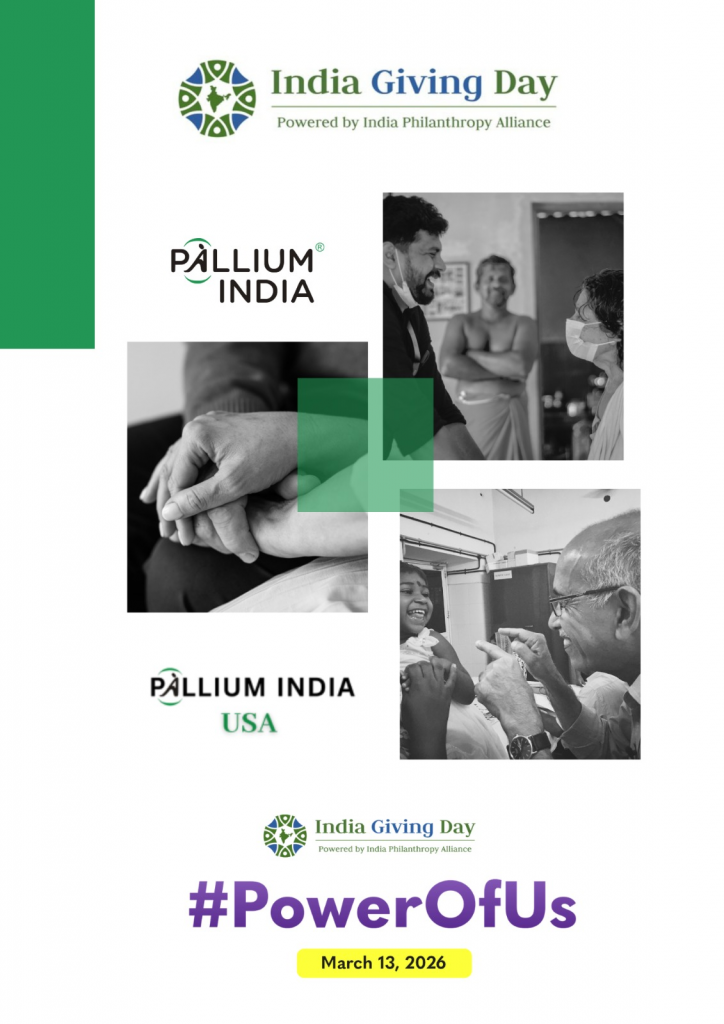Government & Public
Pallium works closely with communities and policy makers at the local, state and central levels, to catalyze palliative care across India, including making opioids available. Pallium India is also engaged in international facilitation for the cause of equitable care in low and low-middle income countries, through participation in Lancet Commissions, Guideline Development with WHO Geneva and so on.
Policy Development, India
- Development of National Program for Palliative Care (NPPC) in 2012.
- Simplification of Narcotic Drugs and Psychotropic Substances (NDPS) rules in 15 states in India, prior to 2013.
- Simplification of Narcotic Drugs and Psychotropic Substances Act of India (NDPS Amendment Act) in 2014.
- Development of Kerala’s Palliative Care Policy in 2008 and its revised version in 2019.
Integrating Palliative Care Education
- Integration of Palliative Care in MBBS Curriculum.
- Developing curricula and teaching modules for medical and nursing education in India.
- Development of the curriculum for the MD course in Palliative Medicine on behalf of Medical Council of India.
- Palliative medicine / nursing certificate courses for doctors, nurses, social workers, and other health care professionals.
- Volunteer Training Programs including home care.
- Project Hamrahi (https://palliumindia.org/programs/hamrahi/)
Pain-Free Hospital Initiative
Pallium India has worked with two major cancer hospitals in India to establish “pain-free hospitals”. They are
- Cachar Cancer Hospital and Research Centre, Silchar, Assam and
- Cancer Research Institute, Dehradun, Uttarakhand.
It has been found that it takes anywhere from 18 days to 254 days for people to form a new habit. (Lally et al. https://onlinelibrary.wiley.com/doi/abs/10.1002/ejsp.674). Our pain-free hospital initiative established with expertise and support from American Cancer Society took this into consideration.
We acknowledged that no hospital can be totally pain-free. The following were the stipulations:
- Ensure uninterrupted availability of essential medicines, particularly of opioids of step III of the WHO analgesic ladder.
- Two trained doctors and two nurses act as pain consultants.
- Two full time nurses do “pain rounds” and ensures compliance of the following activities.
- Every inpatient is asked every day whether he/she has pain and it is documented as the “5th vital sign”.
- If they have pain, it is documented on a 0-10 numerical scale, “0” meaning no pain, and “10” being the worst imaginable pain.
- Every doctor and nurse in the hospital undergoes training in pain assessment and management, as well as periodic refresher sessions.
- Every patient in pain is offered pain management by the ward team.
- When the pain is not easily amenable to relief, the palliative care team is called in.
- The measurements and documentation are followed up for a minimum of one year to ensure continuation.
Measurables:
- Number of patients screened.
- Average pain score from a sample population at the start of the project and after implementation and then monthly.
International Work
We work with national and international organizations for improving access and quality of palliative care. In addition, we have been part of :
- Life Before Death movies–http://www.lifebeforedeath.com/
- Morphine Manifesto– a global initiative to improve access to immediate release oral morphine. https://palliumindia.org/manifesto/
Our partners include World Health Organization, International Association for Hospice & Palliative Care (IAHPC), Worldwide Palliative Care Alliance (WPCA), e-hospice, International Association for Study of Pain, Asia Pacific Hospice Network (APHN), American Cancer Society, Human Rights Watch, United States Cancer Pain Relief Committee, Lance Armstrong Foundation, Savitri Waney Foundation, Wilfrid Bruce Davis Trust, Indo-American Cancer Association (IACA), Australasia Palliative Link International (APLI), Cairdeas International, Family Health International, Care and Share, USA, Indians for Collective Action, USA.
Essential pain relief medicine workshops
We also routinely conduct workshops with providers and authorities to build awareness and sensitivity about essential pain relief medicines. Providers are further assisted on obtaining due licences and navigating bureaucracy to make affordable essential medicines accessible.


